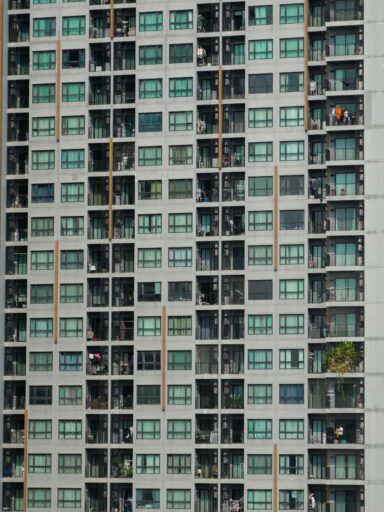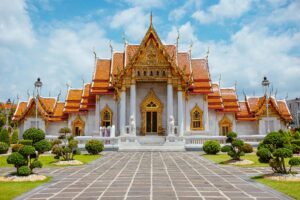The Thailand Elite Visa offers a long-stay privilege program tailored for high-net-worth individuals, frequent travelers, and retirees seeking hassle-free residency.
With durations ranging from 5 to 20 years and bundled VIP services, it stands apart from traditional visa categories.
In this article, we’ll explore key aspects of the Thailand Elite Visa program including:
- Who is eligible for Thailand Elite visa?
- How much is the Thailand Elite visa?
- What are the benefits of having a Thailand Elite Visa?
- Can you buy a house in Thailand if you are a foreigner?
If you are looking to invest as an expat or high-net-worth individual, you can email me (hello@adamfayed.com) or WhatsApp (+44-7393-450-837).
This includes if you are looking for a free expat portfolio review service to optimize your investments and identify growth prospects.
Some facts might change from the time of writing. Nothing written here is financial, legal, tax, or any kind of individual advice or a solicitation to invest. Nor is it a product or service recommendation.

How Do I Qualify for a Thai Elite Visa?
To qualify for a Thailand Elite Visa, applicants must meet basic eligibility requirements like financial stability and zero criminal record.
Unlike traditional visa categories, the Elite Visa has relatively minimal requirements but involves a background screening to maintain the program’s integrity.
- Eligibility criteria (age, background checks, income requirements)
Applicants for the Thailand Elite Visa must hold a valid foreign passport and have no record of overstaying their visa under Thai immigration law. While there is no minimum age requirement, those under 20 must submit written consent from a parent or legal guardian. All applicants must also meet the following conditions:- Have no criminal convictions resulting in imprisonment, except for offenses due to negligence.
- Must not be bankrupt or declared legally incompetent, quasi-incompetent, or of unsound mind.
- Possess the financial ability to pay the membership fee in full (no minimum income is required).
- Thailand reserves the right to deny applications from individuals with serious immigration violations or blacklist status, even if the above criteria are met.
- Application process and documentation
The process begins by submitting a scanned copy of a valid passport, a completed application form, and a high-resolution passport-sized photo. No medical checks or proof of income are required, but applicants must consent to a background check conducted by the Thai Immigration Bureau and related agencies. Once cleared, the applicant receives an approval letter and payment instructions. - Approval timeline and renewal process
The background screening typically takes 1 to 3 months. After approval and payment, the visa can be affixed either upon arrival in Thailand or at a Thai consulate abroad. Renewals depend on the package—some memberships allow continuous stay with renewable entry stamps, while others require re-entry every 90 days. Extensions and upgrades are possible for those looking to switch packages before expiration.
How Much Does a Thai Elite Visa Cost?
The cost of a Thai Elite Visa varies depending on the length of validity and the type of privileges included. The program offers several membership tiers, allowing applicants to choose based on their budget, duration of stay, and lifestyle preferences.
- General cost range: While commonly referred to as a long-term visa, all Thai Elite Visas are technically issued as 5-year renewable visas, bundled into membership packages lasting up to 20 years.
- Thailand Privilege Visa: Bronze Package (5-year visa) – THB 650,000
- Thailand Privilege Visa: Gold Package (5-year validity) – THB 900,000
- Thailand Privilege Visa: Platinum Package (10-year validity) – THB 1.5 million
- Thailand Privilege Visa: Diamond Package (15 years with premium perks) – THB 2.5 million with no annual fee
- Thailand Privilege Visa: Reserve Package (20 years) – THB 5 million for individuals; THB 500,000 per additional family member
The one-time fee model eliminates the need for annual visa renewals, re-entry permits, or income proof required by traditional visa categories, offering unmatched convenience for long-term residents.
What Are the Benefits of Thailand Elite Visa?
Designed to appeal to high-net-worth individuals, retirees, and location-independent professionals, the program combines immigration convenience with luxury services that elevate the long-term stay experience.
- Airport and immigration privileges
Elite Visa members enjoy VIP treatment at major Thai airports, including:- Fast-track immigration lanes for both arrival and departure
- Personal airport escorts and lounge access
- Expedited visa processing for arrivals, extensions, and re-entries
These privileges dramatically reduce wait times and paperwork especially valuable for frequent travelers and those avoiding the usual immigration bottlenecks.
- Visa length and ease of renewal
Depending on the package, membership offers 5, 10, or 20 years of residency via multiple-entry visas issued in 5-year increments. The visa allows up to one year of stay per entry, and renewals are straightforward—no income tests, bank deposit requirements, or reapplication processes typical of other long-stay visas. - Concierge services, healthcare access, and tax perks
Members receive access to:- 24/7 multilingual concierge support for government services, driving licenses, and banking setup
- Annual health check-ups at top-tier hospitals (included in higher-tier packages)
- Support in accessing local tax services and guidance on navigating Thailand’s non-residency tax status, though the visa itself doesn’t exempt holders from tax obligations if they meet tax residency thresholds
- Family inclusion and lifestyle advantages
Certain packages offer discounted rates for spouses and dependents, making the program appealing for family relocation.
Lifestyle benefits may include:- Complimentary golf and spa sessions
- Special rates at luxury hotels and wellness centers
- Exclusive invitations to cultural and networking events
Overall, the Thailand Elite Visa provides not just a legal pathway to long-term residency, but a premium lifestyle upgrade tailored to those who value time, convenience, and high-touch services.
Can I Buy a House in Thailand on an Elite Visa?

No, holding a Thailand Elite Visa does not allow you to buy land, but you can buy a condominium.
The Elite Visa offers long-term stay privileges, but it does not override Thai laws restricting foreign property ownership.
Like all foreigners, Elite Visa holders must follow existing legal pathways when acquiring real estate.
Property Ownership Laws for Foreigners
- Land: Foreigners are generally prohibited from owning land outright in Thailand.
- Condos: Foreign nationals can legally own freehold condominium units, provided foreign ownership in the building does not exceed 49%.
- Landed Property: Villas and houses on land are restricted. Ownership is only possible through alternative legal structures.
Permitted:
- Purchase freehold condominiums.
- Enter 30-year land lease agreements, often renewable.
- Acquire property through a Thai majority-owned company (with legal caution).
- Use legal structures like usufruct or superficies for extended land use.
Not Permitted:
- Own land in their personal name.
- Gain automatic rights to invest in or develop real estate.
Legal Alternatives: Leasing vs. Buying
- Leasing: Most Elite Visa holders seeking villas or landed homes enter long-term lease agreements.
- Company Ownership: Setting up a Thai company is another route but must be compliant with nominee laws to avoid legal risks.
- Structured Offers: Some developers offer tailored packages combining leasehold rights with services, management, and renewal guarantees.
Do Elite Visa Holders Pay Tax in Thailand?
Holding a Thailand Elite Visa does not automatically make you a Thai tax resident, but spending enough time in the country can.
- Tax residency rules for Elite visa holders
Thailand considers someone a tax resident if they spend 180 days or more in the country within a calendar year, regardless of visa type. This means that even if you hold an Elite Visa, you are not subject to Thai personal income tax unless you meet this threshold. Those who do become tax residents are required to declare their global income. - Income sourcing and reporting requirements
Thai tax laws generally tax income sourced in Thailand or remitted into Thailand in the same year it was earned. Notably:- Foreign income earned and kept abroad is not taxed unless remitted into Thailand in the same calendar year.
- Income earned in previous years and remitted in a later year is not taxable under current rules.
- For tax residents, reporting worldwide income is required on the annual tax return, though certain exemptions and deductions may apply depending on the income type and treaty agreements.
Planning tips for Elite Visa holders:
- Limit your stay to under 180 days/year to avoid becoming tax resident if global tax neutrality is your goal.
- Time foreign remittances carefully to avoid triggering tax on income earned in the same year.
- Use legal structures (e.g., offshore trusts or tax-deferred investment vehicles) to manage exposure.
- Consider speaking with a Thai tax advisor familiar with cross-border planning and residency law.
What Is the Difference Between a Thailand Retirement Visa and an Elite Visa?
They cater to different profiles and come with distinct requirements, renewal processes, and lifestyle advantages.
- Age and financial criteria comparison
- Retirement Visa (Non-Immigrant O or OA): Requires applicants to be at least 50 years old, with proof of income of at least THB 65,000/month or a THB 800,000 deposit in a Thai bank (held for a minimum of 2 months before and after visa renewal). Health insurance coverage is also mandatory.
- Elite Visa: Open to applicants 20 years and older with no income or asset requirements, only a one-time membership fee starting at THB 650,000. There are no mandatory insurance policies or proof-of-funds needed.
- Bureaucratic burden and renewal differences
- Retirement Visa holders must complete:
- Annual renewals with updated financial proof
- 90-day reporting at immigration offices
- Medical insurance documentation (especially for OA type)
- Elite Visa holders benefit from:
- Long-term validity (5 to 20 years depending on package)
- No 90-day reporting in person (handled by concierge in some tiers)
- No re-submission of financial or insurance documents
- Retirement Visa holders must complete:
- Lifestyle and flexibility trade-offs
Retirement visas are cost-efficient but come with more red tape and stricter financial compliance. The Elite Visa is significantly more expensive upfront but has special offers such as VIP airport services and government concierge assistance - Which suits expats, retirees, or digital nomads best
- Retirees with stable pensions and Thai connections may prefer the retirement visa for cost reasons.
- Expats and HNWIs seeking minimal paperwork and premium services typically opt for the Elite Visa.
- Digital nomads often choose the Elite Easy Access option to avoid visa runs, stay for extended periods, and avoid financial scrutiny.
Ultimately, the choice depends on budget, age, administrative tolerance, and desired lifestyle benefits.
Conclusion
The Thailand Elite Visa is best suited to globally mobile individuals who prioritize convenience, legal stability, and access to premium lifestyle services.
For expats and HNWIs, it serves as a strategic gateway to long-term presence in Southeast Asia without the typical visa burdens or bureaucratic friction.
Its value ultimately depends on your personal goals, stay duration, and appetite for administrative ease over cost.
Pained by financial indecision?

Adam is an internationally recognised author on financial matters with over 830million answer views on Quora, a widely sold book on Amazon, and a contributor on Forbes.



